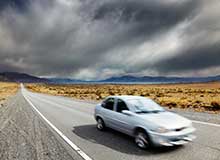Who’s Liable for Driverless Car Crashes?

The idea of artificial intelligence is still not yet completely digested by everyone. Or, will it ever be? At least so say most bloggers and article writers
There will be always be skeptics who find something wrong with smart machines. Thanks to flicks like Resident Evil and Minority Report, some people nominate AI as killing devices that will eradicate and displace humanity.
On the other side of the spectrum, scientists will defend (and create) thinking machines as tools to make life better for human beings. This is the case with driverless cars.
Driverless cars, autonomous cars, self-driving automobiles or robot car — whatever you call it, the idea is navigating the roads without human input. Potential advantages include less traffic collisions and congestion, alleviation on parking scarcity and the long list goes on. But, what if the driverless cars do not realize the “potential” of safety? Who will be liable and responsible?
Government: Regulation and Legislation
The market is predicting that by 2020, the world will witness the new age of driving with the entrée of driverless cars. But, there are still significant hurdles that have to be solved, including legislation.
The most crucial element of all is the involvement of the government on regulation of driverless cars. They will be the one to answer the magic question of who should shoulder the blame in case of autonomous car crashes.
Legitimizing a standard technology for use on the roads is essential. When you have a standard, anything that deviates from it is punishable by the law. In the United States, GM, Ford and Chrysler are the three groups that would possibly build an interest group to spend time and money to get the Congress address the issue.
Laws will have to determine how much will be paid to victims and who will pay. Will there be imprisonment involved? And if so, who will go to jail, then?
Another concern now is how will driving licenses be granted? Do you have to pass the usual driving tests of the state even when you are no longer in control of the car? Will there be separate tests for self-driving cars and traditional automobiles?
Nevada passes a law authorizing driverless cars in 2011. But, regulations remain unclear. Work is cut out for the government, without a doubt.
Car Manufacturers: Quality Control
You can longer blame people caught in driverless car crashes of texting while driving, DUI, breaching traffic rules, overspending, or changing lanes. The manufacturer will have to take serious blows in case of accidents involving self-driving automobiles.
While manufacturers may not directly be involved in creating the smart technology that will control the car, their brand is what people always see. Today, when there is a malfunction in steering wheel or brakes and car brands like Toyota recalls x number of cars, their brand gets the negative effect (at least in the public’s eyes), and not the supplier of these car parts. The similar consequence will be when they introduce driverless cars in the market.
But, it is not as if they have zero control over what they put in their cars. Of course, they do! They have departments solely built for quality inspection and testing of cars. These sections will be decisive for car manufacturers.
Smart Technology Makers: Networking and Communications
When a driverless car crashes, the technology embedded within the automobile will surely be in hot water. There is also the threat of being sanctioned permanently depending on the gravity of the accident.
There is the possibility that Google will have to reveal then their top secret AI laboratory if authorities will push further. Will Larry Page submit? This will be more than interesting, knowing how the Google guys work stealthily.
Insurance: The Overjoyed Party
If the promise of less accidents holds true, insurance providers will be the happiest group. Pretty sure they won’t pull down premium and stick with what they charge now. And in return, they will shoulder a lower risk of burden of paying for car damages from crashes.
Insurance companies will also have to amend their policies and tailor-fit to driverless cars. They need to do three things:
- Adhere with the laws addressing issues of driverless car crashes
- Coordinate with manufacturers to study risks and calculate probable losses from there
- Educate clients
Consumers: Winners or Losers?
The answer to that will circle back to legislation. How fast is the insurance providers’ response? What fraction will be covered by the car manufacturers?
Definitely, legislation will play a huge role when the roads welcome driverless cars. These will not only be disruptors within the technology avenue, but also within the automobile industry. Now, the big question is — is mankind ready to take in the idea of giving full control of driving decisions to smart technology?
It’s Your Turn
Will you allow your family to ride a driverless car? What are your major concerns about the idea of an artificial intelligent car? What important piece of legislation should the government look into? Do you think a global convention around this matter is necessary?
Route your ideas, questions, recommendations and thoughts around this topic. We’ll be waiting.
Adam Prattler is a big enthusiast of ethical blogging and educating readers. He can route you to the best accident lawyer in Morgan Hill in a speed of light. He also likes to write guest posts for various topics.
